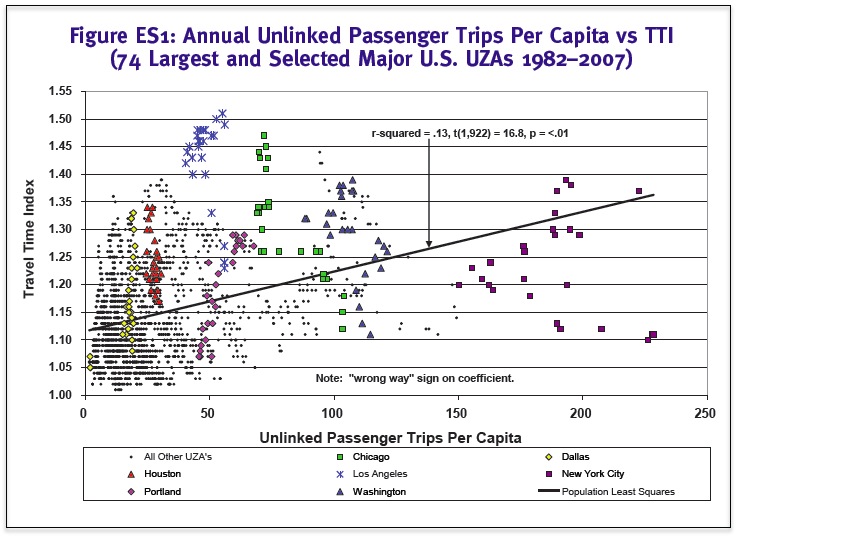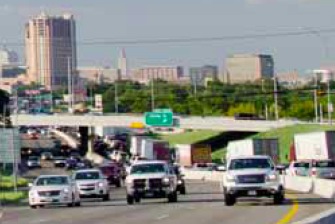REASON FOUNDATION
By Thomas A. Rubin and Fatma Mansour
Project Director: Baruch Feigenbaum
Executive Summary
- Statistical analysis of the 74 largest urbanized areas in the U.S. over a 26-year period suggests that increasing transit utilization does not lead to a reduction in traffic congestion; nor does decreasing transit utilization lead to an increase in traffic congestion.
- Policies designed to promote transit utilization can in certain instances increase traffic congestion—as appears to have been the case in Portland, Oregon.
- Vehicle-miles traveled per freeway lane-mile is strongly correlated with traffic congestion: the more people drive relative to available freeway capacity, the worse congestion gets.
- Data from New York and Los Angeles indicate that the most effective way to increase transit utilization is by reducing fares, as well as by improving basic, pre-existing service
Introduction
Many commentators, analysts and policymakers claim that increasing transit utilization reduces urban traffic congestion. However, very few transportation studies have attempted to prove this assertion.
This policy study addresses the issue by statistically analyzing the 74 largest urbanized areas (UZAs) in the U.S. over a 26-year period, from 1982 to 2007. It also contains case studies of seven urbanized areas that one would expect to best demonstrate the statistical relationship between transit utilization and traffic congestion, if such a relationship exists. Those urbanized areas are:
- New York City, Los Angeles and Chicago, which are the three largest urbanized areas in the country;
- Dallas, Houston and Washington, D.C., which are very large urbanized areas that have made major improvements to their transit infrastructure relatively recently, and
- Portland, which is generally considered to have one of the most intensive transit-oriented “smart growth” programs in the U.S.
In its examination of both the 74 largest urbanized areas in the country and the seven case studies, this study aims to answer two overarching questions that are of vital importance to transportation policymakers:
- Firstly, does an increase in transit utilization lead to a reduction in traffic congestion, and vice versa?
- Secondly, does an increase in vehicle-miles traveled (VMT) lead to an increase in traffic congestion, and vice versa?
This study uses the Texas Transportation Institute’s Travel Time Index (TTI) throughout to measure traffic congestion. Two different measures are used for transit utilization: annual transit unlinked trips per capita and annual transit passenger-miles per capita. The overall analysis of the 74 largest urbanized areas uses two VMT figures: VMT per lane-mile on freeways and VMT per lane-mile on arterial streets. The case studies use only the freeways figure, as the arterial street analysis, while significant, was far less so than the freeway analysis.
Accordingly, this study’s statistical analysis provides empirical answers to the following four questions:
1. What effect does the number of annual transit unlinked trips per capita have on traffic congestion in major urbanized areas?
2. What effect does the number of annual transit passenger-miles per capita have on traffic congestion in major urbanized areas?
3. What effect does the number of vehicle-miles traveled per freeway lane-mile have on traffic congestion in major urbanized areas?
4. What effect does the number of vehicle-miles traveled per arterial lane-mile have on traffic congestion in major urbanized areas?
The study’s finding on each of these research questions is detailed below. This is followed by summaries of all seven case studies, in which only the first three questions are discussed.

Download full version (PDF): Transit Utilization and Traffic Congestion
About Reason Foundation
reason.org
“Reason Foundation advances a free society by developing, applying, and promoting libertarian principles, including individual liberty, free markets, and the rule of law. Reason Foundation produces respected public policy research on a variety of issues and publishes the critically-acclaimed Reason magazine. Together, our top-tier think tank and political and cultural magazine reach a diverse, influential audience, advancing the values of choice, individual freedom and limited government.”
Tags: Congestion, Reason Foundation, Traffic







 RSS Feed
RSS Feed